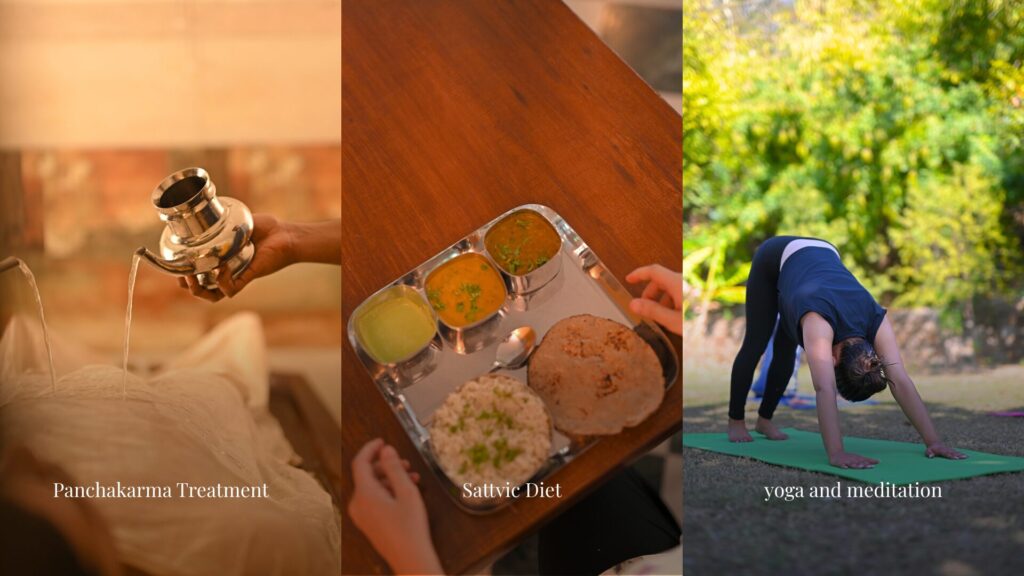The well-known debate of Ayurveda vs Allopathy is a conversation about philosophy, treatment duration, side effects, prevention, and people’s want from health care. In recent years, “Ayurveda” has become the first choice of many Indians for natural healing and care.
This respective shift from allopathy to ayurveda is driven by people’s interest in long-term recovery, concerns about side-effects of modern drugs, rising lifestyle-related disorders, and more.
Hence, this article covers both systems in depth, which includes core philosophies, diagnosis, integrated approach of each and more.
Understanding Ayurveda: Philosophy, Method, and Medicines
Core Philosophy
Ayurveda is a more than 5000-year-old health system from India, that’s core idea is balance. Health is the balance in body, mind, and spirit. In Ayurveda, diseases arise when this balance breaks or there is imbalance in tridoshas (Vata, Pitta, and Kapha).
Therefore, the ayurvedic treatments aim to restore doshic balance, improved digestion (agni), remove toxins (ama), and strengthen immunity.
Diagnostic Approach
Diagnosis in Ayurveda is holistic because doctors use –
- Nadi Parikshan (In depth pulse reading)
- Observation of tongue, eyes, skin, and stools
- Detailed health seeker health and lifestyle history about sleep, digestion, habits, and emotions
- Prakriti (constitutional) assessment to find a person’s natural doshic balance
Usually, well-experienced and senior Ayurvedic doctors combine classical methods with lab reports to correctly diagnose the health issue.
Several Methods of Ayurvedic Treatment
Ayurveda uses a combination of diet alteration, behaviour, herbs, and Panchakarma therapies.
- Diet and lifestyle are customised to balance the doshas and seasons
- Herbal Medicines like decoctions formulated as per classical texts
- Classical Ashtavaidyan-based Panchakarma which broadly includes five deep-cleansing (detoxifying) therapies to remove accumulated amas from the body, responsible for causing ailments
- Ayurvedic treatments include Abhyangam, Kati Vasti, Shirodhara, Podikkizhi, and more
- Meditation, Pranayama, and counselling
Types of Medicines
Several types of medicines used in Ayurvedic treatments include decoctions (kashyas), herbal concoctions, churna (powders), lehya, ghritham, taila (medicated oils) and more.
Hence, it is important to remember that ayurveda is slower as compared to allopathy because it focuses on treating the root causes of the ailments. Many chronic ailments require 21 days or more of care but some acute symptoms respond to the treatment much faster.
Safety and Side Effects
When ayurvedic treatments are prescribed correctly by senior and well-experienced doctors, everything is safe. Health seekers will see some side effects from the treatment only in case of poor quality products or incorrect self-medication. So, high-quality medicines, correct dosing, and under doctor’s supervision are important.
Understanding Allopathy (Modern Medicine)
Core Philosophy
Allopathy or modern medicines, is complete Science, which means evidence-based treatments. Western medicine focuses on identifying specific biological causes of diseases by treating symptoms and underlying pathology using drugs, surgery, bio-instruments, and supportive care.
Diagnostic Approach
Allopathy relies on objective tests like blood tests, imaging, biopsies, microbiology and more. In Allopathy medicine, there is a standardised diagnostic criteria and staging for many ailments.
Treatment Methods
- Pharmaceutical drugs including antibiotics, antihypertensives, insulin, chemotherapy, and more
- Surgery and procedures (orthopedic, cardiac, neuro)
- Emergency care like resuscitation, ventilation, dialysis
- Preventive measures such as vaccines and screening
Types of Medicines
- Single active molecules with known pharmacokinetics
- Combinations of drugs for complex diseases
- Strict regulatory manufacturing and quality controls in countries
Treatment Duration and Goals
Allopathy often acts faster as compared to ayurveda. It is so fast that in case of infections, heart attacks, trauma, or acute medical crises, it is lifesaving and essential. Also, long term management of chronic diseases is also done via drugs and medical intervention.
Safety and Side Effects
Although modern medicines are quick, they have side effects and long-term toxicity. Adverse drug reactions occur and require monitoring. Hence, Allopathy prioritizes measurable outcomes and rapid symptom control.
Diseases Best Treated Using Allopathy
Allopathy excels in acute and life-threatening conditions and in precise surgical or interventional needs as follows –
- Trauma and Emergencies: Medical emergencies include fractures, internal bleeding, shocks, burns, or more
- Acute Infections: Sepsis, bacterial meningitis, advanced pneumonia (antibiotics and ICU can save lives)
- Surgical Emergencies: Appendicitis, bowel perforation, obstructed hernia
- Acute Cardiac Events: Heart attack, unstable angina, requiring thrombolysis, stents, surgery
- Advanced Cancer: Cancer cannot be cured using Ayurveda. Cancer treatment include surgical removal, radiotherapy, chemotherapy for curative or palliative intent
- End-stage Organ Failure: Need for transplant, dialysis
- Acute Neurological Emergencies: Stroke interventions, severe head injury management
Why Allopathy? These medical conditions mentioned-above require allopathic interventions that are fast, targeted, and supported by large clinical trials.
Pros & Cons of Allopathy
| Rapid symptom relief | Side effects and drug interactions |
| Clear protocols and measurable outcomes | Often focuses in symptom control rather than root cause |
| Livesaving in case of emergencies | Costly interventions and long-term medication dependence for chronic conditions |
| Strong diagnostic tools |
Diseases Best Treated Using Ayurveda
Ayurveda shines in chronic, lifestyle-related, functional, and degenerative conditions where long-term balance, immunity, and metabolism matter.
Common Conditions Where Ayurveda is Effective
- Metabolic and Lifestyle Disorders: Diabetes Ayurvedic treatment focuses on diet, herbs, and detox to improve sugar control and reduce complications. Many health seekers are able to improve glycemic control when they include ayurveda in their lives under supervision.
- Thyroid Disorders: Thyroid ayurveda approaches to balance immunity and metabolism. So, ayurveda tends to help mild to moderate hypothyroidism or subclinical cases via dietary and herbal support. However, autoimmune thyroid diseases need careful integrated management.
- Chronic Pain and Arthritis: Osteoarthritis, Rheumatoid Arthritis can be managed with Panchakarma, herbal anti-inflammatories, and physiotherapy for long-term relief.
- Digestive Disorders: IBS, chronic dyspepsia, constipation and similar disorders can be managed by individualized prescribed diet, gut-targeted therapies, yoga sessions and more.
- Skin-Related Ailments: Ayurveda has a long lasting power to treat eczema, psoriasis, acne using internal and external herbal treatments.
- Stress, Anxiety, Sleep Problems: Brahmi, Ashwagandha, Shirodhara, and lifestyle changes reduce psychological distress like anxiety.
- Neurological Rehabilitation: As per a recent study, it was found out that Ayurveda has rehabilitative potential to treat neurological deficits caused by traumatic spinal cord injury. Others include post-stroke rehabilitation, neuropathy support with therapies like Abhyanga and Basti.
- Chronic Fatigue and Immune Dysregulation: Rasayana therapies, diet alteration and support can help a health seeker to recover from fatigue and related issues.
Diabetes Ayurvedic Treatment and Thyroid Ayurveda
- For diabetes the Ayurvedic treatment plan includes dietary control, exercise, herbs like Guduchi and Amalaki. Also, integrating classical Panchakarma to cleanse the body. This approach not only reduces the reliance on medication but also improves metabolic markers.
- In thyroid management, ayurveda supports metabolism, reduces symptoms, targets immune balance, especially in autoimmune cases.
Pros and Cons of Ayurveda
| Focus on treatment of root cause of the ailment | Slower results, especially in chronic disease management |
| Personalised medicine for sustainable healing and reduced long-term side effects | Not suitable as a sole therapy for life-threatening conditions |
| Holistic approach towards healing (diet, lifestyle and health seeker empowerment) | Scientific evidence for some treatments is still emerging. Still more high quality trials are required |
| Ayurvedic therapies improve quality of life and functional capacity |

Is Ayurveda a better preventive measure compared to Allopathy?
For prevention and long-term wellness, Ayurveda offers major strengths. For emergency prevention strategies like vaccination allopathy is more effective.
Why Ayurveda is Strong for Prevention
- Lifestyle-centered: Ayurveda prescribes daily routine, seasonal routines, appropriate food and sleep. This reduces the risk of chronic disease.
- Early Correction: Small imbalances in doshas can be stopped from turning into a major disease, if addressed timely.
- Immunity Strengthening: Rasayanas, diet, and Panchakarma can support immunity.
- Behavioral Change: Health seeker’s willingness to change and alter their lifestyle is core to getting healed.
Limits
- For epidemic control and rapid prevention of infections, modern public health tools like vaccines, antibiotics, sanitation are vital. Ayurveda can complement the allopathic treatment but it cannot replace allopathy.
Conclusion on Prevention: The optimum combination of allopathy and ayurveda works the best. Using vaccination and public health measures from allopathy along with Ayurvedic lifestyle for optimal prevention.
Does Ayurveda Give Instant Results? How?
Ayurveda can offer fast relief for the treatment of certain symptoms, however some take time.
Conditions with Rapid Response
- Acute indigestion often improves quickly with herbal decoctions and a regulated diet.
- Insomnia and anxiety usually takes time to respond to the treatment. Therapies like Shirodhara take days to weeks to calm down.
- Acute musculoskeletal pain can show quick improvement after some local ayurvedic therapies like Kati basti or Abhyangam.
Conditions Requiring Longer Treatment
- Chronic metabolic diseases such as diabetes and hypothyroidism need weeks to months of sustained therapy and monitoring.
- Autoimmune disorders, advanced degenerative disease, and severe skin disorders often need longer combined treatments and in some severe cases allopathic care too.
Ailments Ayurveda Cannot Cure (Limitations)
Life-Threatening Emergencies (Heart Attack, Severe Sepsis, Severe Trauma | End-Stage Renal or Liver Failure | Cancer | Bacterial Meningitis, Severe Pneumonia | Genetic or Congenital Disorders
Advantages of Ayurvedic Medicines and the Future of Ayurveda
One of the key ayurvedic medicine benefits is its holistic approach to treat ailments from the roots. Instead of suppressing the symptoms, ayurveda treats body and mind together. Treatments are fully personalised according to an individual’s constitution (Prakriti), dosha imbalance, lifestyle, and environment, making them highly adaptable to each health seeker’s unique needs.
Also, most remedies in Ayurveda are plant-based, and typically have fewer long-term side effects when practiced under doctor’s supervision. Additionally, this natural and sustainable approach to healing appeals to health seekers who prefer natural healing over man-made pills.
Modernizing Ayurveda for Global Reach
The future of Ayurveda lies in combining its classical wisdom with modern science. Standardization of herbal preparations, advanced quality control and well-designed clinical trials. (Interestingly, there have been clinical trials in the field of ayurveda to test its wide reach and effectiveness.)
With growing international recognition of ayurvedic medicine benefits for lifestyle disorders, hair care, and chronic disease management, Ayurveda is more accessible and becoming the first choice of a global audience.
Why Are More Indians Choosing Ayurveda?
In recent years, a growing number of not only Indians but global health seekers are turning to Ayurveda over allopathy as their first choice of treatment. Why? Because ayurveda is capable of offering that allopathy overlooks.
Ayurveda aims to identify the root cause of health problems and restore balance through diet, lifestyle, herbal remedies, and detox therapies like Panchakarma. Additionally, government initiatives, growing clinical research, and the expansion of ayush centers, wellness centers like Vaidyaratnam Vrindavan Ayurveda Chikitsalayam, in North India boost trust in wellness through ayurveda.





